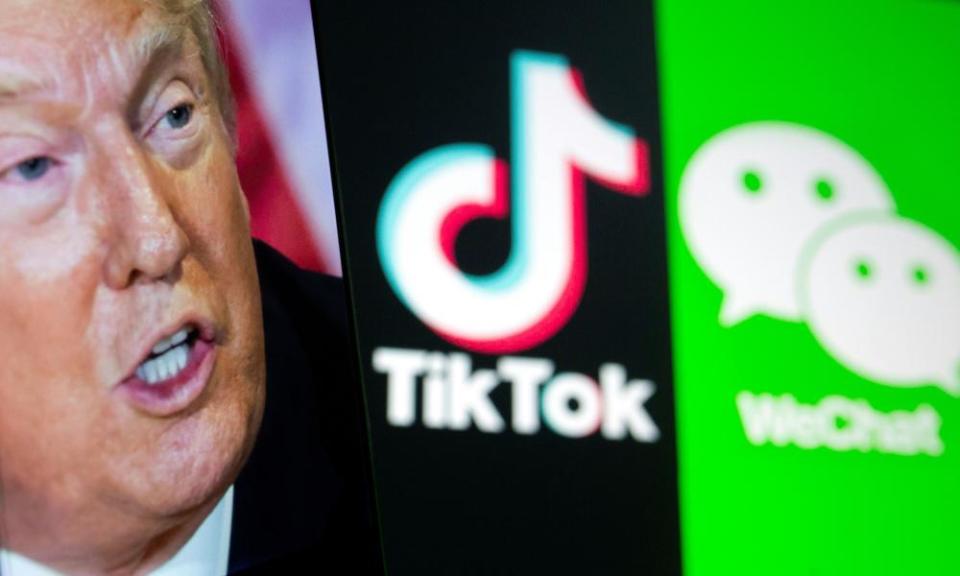‘I will be cut off’: Chinese Americans feel targeted by Trump's WeChat order

Chinese Americans have had their daily communications unwittingly swept into the US-China trade war, as the Trump administration threatens to ban China-based messaging platform WeChat.
For many Chinese Americans WeChat is a lifeline connecting them to family and friends in China, and within Chinese American communities – one that will be severed if the American restrictions go through.
“It’s really sad,” said Joanne, who owns a salon in Oakland, California, and asked her last name not be used for the story. “I moved here 26 years ago and I have only been able to reconnect with friends and family in China recently because of WeChat. Without it, I will be completely cut off.”
WeChat was founded in 2011 by Allen Zhang in China, where it is called Weixin. It is one of few apps available and widely used in both China and the US – Facebook Messenger and WhatsApp are both banned in China, making WeChat the “primary app Chinese-speakers in the US use to participate in social life”, according a legal filing against Trump on behalf of WeChat.
Related: China attacks US 'bullying' over ban on Tiktok and WeChat
The Trump administration targeted the app, which has 700 million monthly active users in China and more than 19 million monthly users in the US, with a 6 August executive order that would remove WeChat and any updates to it from US app stores and prevent users in the US from sending or receiving money in the app. The order also took aim at TikTok, the video-sharing platform owned by Chinese firm ByteDance.
In the order, Trump cited security concerns, saying WeChat “allow[s] the Chinese Communist party access to Americans’ personal and proprietary information”. He also claimed WeChat could be used for disinformation campaigns.
A judge blocked the order against WeChat in a preliminary injunction on Monday, saying that while some Chinese technologies may pose a legitimate national security threat to the United States, “the specific evidence about WeChat is modest”, according to the filing.
The targeting of WeChat comes after months of conflicts over trade between China and the US, and a spew of anti-Chinese statements from Trump. The US president repeatedly referred to Covid-19 as the “China virus”, “the Wuhan virus”, “China Flu”, and “Kung-Flu”. The ban is a continuation of the president’s racism, lawyers for WeChat wrote in the complaint.
“By prohibiting the use of WeChat but not other apps that are used primarily by people who are not of Chinese or Chinese American ancestry [the executive order] singles out people of Chinese and Chinese American ancestry and subjects them and people who communicate with them to disparate treatment on the basis of race, ethnicity, nationality, national origin, and alienage,” the court filing reads.
Joanna said the potential WeChat ban, which was announced just days after she reopened her salon following Covid-19 restrictions, is an extra hurdle she will have to face in addition to ongoing financial struggles related to the coronavirus. She said most of her local customers book appointments with her over WeChat, and she worries many will lose contact with them if they cannot use the app. “It is a really difficult time to be a business owner,” she said.
A restaurant owner nearby who also asked to remain anonymous said she uses WeChat every day and plans to switch to WhatsApp to speak to locals if the ban goes into effect. She does not know how she will stay in contact with family in China, with whom she communicates almost exclusively through WeChat.
“Many of us aren’t citizens so we can’t really do anything,” she said. “Everybody is struggling right now.”
Many Americans say they will simply keep WeChat on their phones and avoid updating it so they can continue to communicate with contacts in China. This has potentially severe privacy and security implications, said Hina Shamsi, director of the American Civil Liberties Union’s National Security Project.
“The order harms the privacy and security of millions of existing TikTok and WeChat users in the United States by blocking software updates, which can fix vulnerabilities and make the apps more secure,” Shamsi said. “To truly address privacy concerns raised by social media platforms, Congress should enact comprehensive surveillance reform and strong consumer data privacy legislation.” TikTok, meanwhile, has narrowly escaped the ban by brokering a deal with tech firm Oracle to run US operations.
While in the short term US users could find ways to continue using the app, “the inconvenience of doing so and the diminished functionality” will ultimately push them to alternatives, predicted market analysis firm eMarketer analyst Shelleen Shum.
Shum said WeChat will likely maintain its popularity in China because while US users can switch to Whatsapp and other alternatives, Chinese users have fewer non-government options.
Though US users technically have more alternatives, a migration will not be easy, said Daniel Castro at the Information Technology and Innovation Foundation, a Washington DC-based tech policy institute. Even if users find alternatives, Trump’s ban sets a dangerous precedent.
“The United States is not banning WeChat because of any specific security threat, but simply because it is a popular Chinese app. If another apps takes its place in 6 months, is there any reason to suspect the Trump administration wouldn’t ban it too?” he said. “We don’t know which app will be banned next.”

